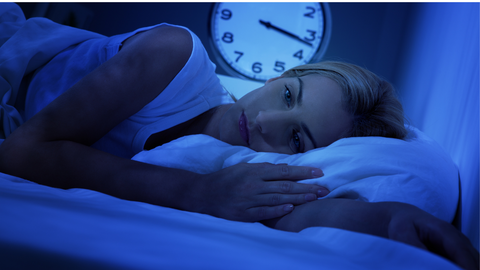Getting a good night’s sleep is foundational for overall health and wellness. However, in the last decade, we have evolved into a 24-hour society vs a 12–14-hour one, which has impacted our sleep dramatically. This blog explores how prebiotics and sleep are connected—and how supporting your gut with chicory root fibre could lead to more restful nights, naturally.
While there’s no magic prebiotic supplement for sleep, research shows that improving gut health can have a positive impact on sleep quality. That's why many are turning to natural sleep remedies that support the gut-sleep connection.
So, can better gut health help you sleep better? Let’s dive into how ió Gut Health Drink, rich in prebiotic fibre for better sleep, can play a role in your sleep-wellness routine.
Coming up in this article:
-
Poor sleep – a global epidemic
-
Benefits of sleep
-
The connection between [prebiotics and sleep]
-
What are prebiotics?
-
Gut health and sleep
-
Can sleep be improved by prebiotic fibre for better sleep?
-
When is the best time to take prebiotics?
-
Why chicory root fibre may support better rest
Poor sleep – a global epidemic
Poor sleep has been documented globally as being on the rise. (2) In the UK, 22% of people struggle to fall asleep every single night, and the demand for insomnia medication prescriptions has skyrocketed. In May 2019, there were 438,399 prescriptions for the sleep medication zopiclone, and by May 2019, monthly prescriptions for melatonin had risen by 148% since June 2014. (3)
Furthermore, 40% of people experienced insomnia and sleep problems during COVID; this will most likely have led to an even further increase in the use of sleep medications. (4)

Due to a lack of sleep, the knock-on effects can be huge. It can affect social relationships, school productivity and overall decision-making in addition to an array of health issues. As a result, we should never underestimate the power of a good night’s sleep!
Research suggests that your sleep can be affected by gut health, and vice versa, due to the connection between your brain and your gut microbiome. Some researchers believe that by improving your gut microbiome, you can indirectly support your sleep. That’s where prebiotics and sleep come together.
Benefits of sleep
Although many people associate a good sleep with reducing tiredness and fatigue, achieving a restful night’s sleep can go far beyond waking up in the morning feeling refreshed and ready to meet the day.

A good night’s sleep can also be beneficial for:
- Day-to-day cognitive function
- Improving mood
- Mental health
- Feeling re-energised
- Reducing stress
- Allowing muscles time to recover
- Cardiovascular health (5)
- Improved complexion
- Inflammation (6)
Furthermore, did you know that lack of sleep can have an impact on your digestive health and increase the risk of type 2 diabetes, heart problems, gastrointestinal diseases and obesity, and even influence the types of foods you choose to eat?
“Sleep is the golden chain that ties health and our bodies together.” Thomas Dekker

The connection between prebiotics and sleep health
When we struggle to sleep, it’s easy to focus on our mattress or stress levels — but many people don’t realise that the secret to a better sleep microbiome connection may lie in gut health.
A study from the University of Colorado explored whether dietary prebiotic fibre for better sleep: fibres that feed good gut bacteria – could influence sleep patterns. (7)
“We found that dietary prebiotics can improve non-REM sleep, as well as REM sleep, after a stressful event” – Robert Thompson, the first author of the study published in the journal Frontiers in Behavioural Neuroscience.
What are prebiotics?
Prebiotics are a special type of fibre that is a unique food scientifically proven to increase healthy microbes (probiotics) in the gut.

Without prebiotics, probiotics don't have the right food that they love (and need) to not only survive but also thrive and flourish.
That's why prebiotics are ultimately the cornerstone to gut health – and overall health and well-being.
You can read more about prebiotics here: What is prebiotic fibre?
Sleep & gut health
More and more research proves that there is a definite relationship between the ‘good’ bacteria that live in our digestive system and our overall health and well-being, including supporting mental health via what is known as the ‘gut-brain axis’.
This gut-brain axis can help support improved sleep health by nourishing the good gut bacteria living in the gut microbiome, which comprises trillions of bacteria.

Researchers found that gut microbiome diversity is associated with human sleep physiology in another study. (8) This study found that the more diverse the gut microbiome is, the more it correlates with better and longer sleep.
In this video, Dr Benjamin Snider discusses how prebiotics can help you sleep better and even cure insomnia:
Anxiety and depression can be gut-health related
Did you know?
90% of serotonin (the 'happy hormone') is produced in the gut; by consuming prebiotic fibre for better sleep, you're helping to create a happier and healthier gut microbiome.
Can Poor Sleep Affect Gut Health?
A study from Uppsala University in Sweden found that after just two nights of reduced sleep, certain strains of gut bacteria dropped by nearly 50%. (9)
This two-way street between gut health and sleep reinforces how important it is to nourish your gut — especially if you’re experiencing sleep issues.
When is the best time to take prebiotics for sleep?
The best time to take prebiotics for sleep is right before bed.
According to Dr Patricia Raymond, a gastroenterology and internal medicine physician, the gut is relatively inactive overnight — making it a good time to support gut bacteria with prebiotics.
This is because "the gut is pretty inactive at night. If you think about it, you don't usually wake up in the middle of the night to poop," says Patricia Raymond, MD, a gastroenterology and internal medicine physician.
Why Chicory root fibre: the best prebiotic for improved sleep quality
Chicory root fibre is one of the richest sources of [prebiotic fibre for better sleep], and it's the primary prebiotic used in ió Gut Health Drink.
Approximately 68% of chicory root fibre is inulin — a powerful prebiotic known to feed beneficial gut bacteria.
ió Gut Health Drink delivers 100% of your daily intake of prebiotics via soluble [chicory root fibre], plus 20% of your recommended daily fibre intake.
Our research found that within 12 days of drinking ió daily, 73% of participants reported improved sleep with no other lifestyle changes.

"Absolutely love this drink. I felt instant benefits after just a few days! My energy levels improved and my sleep has been so much better!" Sigi G.
You can read Sigi's full review here.
ió Gut Health Drink Proven to Increase Probiotic Bacteria
In a study conducted by Dr John Butcher and Dr Ryan Kean at Glasgow Caledonian University, ió Gut Health Drink was shown to produce:
-
A 4 million percent increase in the probiotic S. Boulardii
-
A 25,000 percent increase in B. Coagulans
These results were seen within 48 hours compared to flavoured water.
 You can read the Glasgow Caledonian press release about this exciting study here. (Please note that we have re-branded and the press releases were for our original branding, ió fibrewater.)
You can read the Glasgow Caledonian press release about this exciting study here. (Please note that we have re-branded and the press releases were for our original branding, ió fibrewater.)
Additionally, this study has been shortlisted for the Scottish Knowledge Exchange Innovation of the Year award 2023. You can read the press release about the award here.
Conclusion
So, is there truly a best prebiotic for sleep?
Not exactly, but if you’re looking for a natural way to support gut health and, in turn, enjoy more restful sleep, ió Gut Health Drink may be the perfect place to start.
Try ió today, and use code SLEEP15 for 15% off your first order. Sleep well, naturally.

_____________________________________________________________
(1) As many as 16 million UK adults are suffering from sleepless nights as a third (31%) say they have insomnia, Aviva, https://www.aviva.com/newsroom/news-releases/2017/10/Sleepless-cities-revealed-as-one-in-three-adults-suffer-from-insomnia/
(2) Sleep problems: An emerging epidemic? PubMed, https://www.ncbi.nlm.nih.gov/pmc/articles/PMC3397790/
(3) Insomnia statistics UK, Linen Bundle, https://www.linenbundle.com/blogs/news/insomnia-statistics
(4) Can Covid-19 cause insomnia and sleep problems? https://www.sleepfoundation.org/covid-19-and-sleep/covid-insomnia
(5) Sleep plays an important role in heart health, American Heart Association, https://www.heart.org/en/health-topics/sleep-disorders/sleep-and-heart-health
(6) Why is inflammation worse at night? https://thesleepdoctor.com/2019/01/01/5-things-to-know-about-sleep-and-inflammation/
(7) Better sleep? Prebiotics could help
https://www.colorado.edu/today/2020/03/03/better-sleep-prebiotics-could-help
(8) Gut microbiome diversity is associated with sleep physiology in humans https://www.ncbi.nlm.nih.gov/pmc/articles/PMC6779243/
(9) Sleep loss tied to changes of the gut microbiota in humans, Uppsala University, https://www.uu.se/en/news/article/?id=7512&typ=artikel
*41 participants drinking one bottle of ió Gut Health Drink daily for 12 days.




